Tempted by Retirement in Scotland?
Category: Best Retirement Towns and States
July 8, 2019 — If you are looking for a place to retire where it is tranquil and beautiful with a cool temperature, you might want to consider Scotland. During our recent enchanting exploration of the country, which definitely lives up to the beauty portrayed in Outlander, Monty Python, the Davinci Code, or Game of Thrones, we discovered more than just stunning landscapes. While enjoying the breathtaking views of Scotland’s 130 inhabited islands, we also noticed an emerging interest among retirees in leisurely pursuits, including exploring best online casinos for entertainment during their downtime. A country that is part of Great Britain, Scotland is bigger than you might think, about the size of South Carolina, with a tremendous range of regions where you might want to retire. Even if retiring here doesn’t appeal to you, Scotland still makes a wonderful retirement trip!
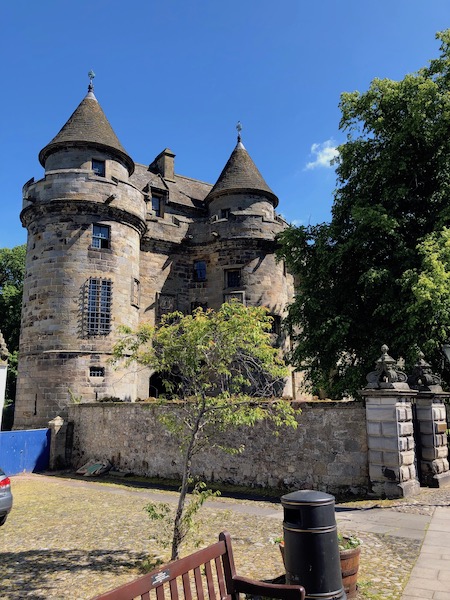
There are livable cities like historic Edinburgh or Glasgow. Charming market towns like Peebles or Moffat. University towns like St. Andrews. Or you could choose to live in a town like Portree on the stunning Isle of Skye. The areas around the many lochs (lakes) provide idyllic living choices. One of our friends would like to retire in Scotland because he likes its relaxed atmosphere and cool climate. It is also rainy much of the year, which is one reason why everything seems so green and there are flowers – both wild and cultivated – everywhere. But as beautiful and charming a place as Scotland is, there is one great problem – it is very difficult, but not impossible for an American to retire here. But more about that later.
The people are friendly and active. People of all ages are out walking, hiking, and cycling. The country has countless trails for these activities. Even though the population is aging every town seems to have an outdoor store featuring all kinds of high tech clothes and equipment for mountaineering, hiking, and biking. Almost every town has a beautiful public golf course.

Restaurants and pubs offer good food, music, and a chance to meet people. Every town seems to have a full range of small shops. Many services are provided for older citizens. Medical care is first rate and widely available., either as part of national health care or from private providers.
Transportation
Most of the country has great public transportation. Train service is very good and you can take a train to anywhere in Europe from many towns. Buses are plentiful and the cities have trams. Roads are good but driving on the left takes some getting used to for transplants from abroad. West Island Way is a popular inter-town hiking trail. International airports in Glasgow and Edinburgh can easily connect you to the world.
Where to live
Newcomers to the country will have to research and visit different areas to identify the town or region they might want to settle in. Renting is obviously the easiest and most risk free approach, although foreigners can buy property if they want. On our tours of the country we tended to visit towns popular with tourists, which means they are beautiful, have more restaurants and better shops, are more expensive on average, but do have to live with an active tourist presence. But there are many other small towns that are just as charming and offer a quiet place to retire.
Here is a selection of towns that we think are worthy of consideration, if you are thinking about retiring to Scotland.
West of Edinburgh
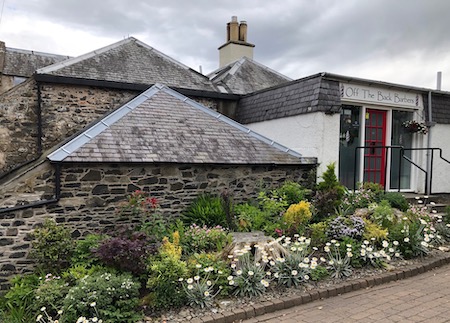
Peebles is a former spa town on the Tweed River. Located in an area that was famous for its woolen textiles, wealthy people used to come to Peebles to take cold water spa treatments from its springs. Now popular with tourists, the town was named one of Scotland’s best independent retail shopping towns. It has an abundance of cute stores and many beautiful churches. The Peebles Hydro spa and resort is a grand old place on the hill.

Melrose is a small market town highlighted by the stunning ruins of its Abbey, where Robert the Bruce’s heart is supposedly buried.
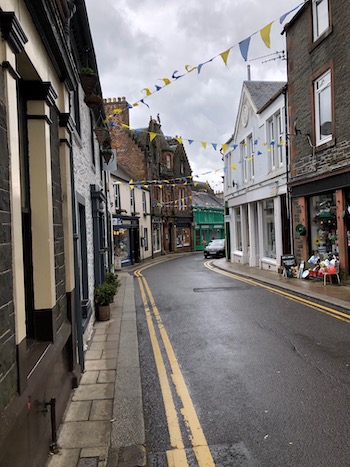
Moffat is a market town with great squares and churches. The shops have a wonderful selection of woolens, some by high-end designers. One thing that make towns like this interesting retirement choices is the number of community festivals enjoyed by the whole community. Moffat is no exception. If you visit eat at The Rumbling Tums restaurant – the jacket potato and coronation (curry) chicken is very good.
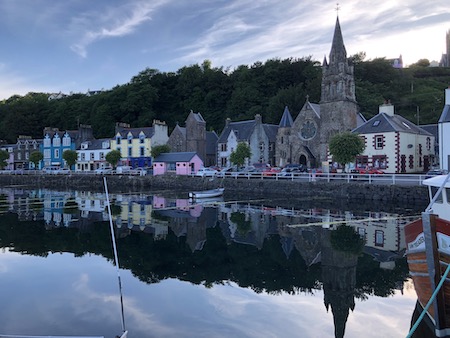
Tobermory, the main town on the isle of Mull (one of the inner Hebrides), is an unusually beautiful and quiet port with pastel painted houses all along the waterfront. A golf course is up on the cliffs. It is not that easy to get to Mull, since the ferry from Oban takes at least an hour. Once here, the single track roads take some getting used to. Highland cows – healund coos, as it is pronounced locally – are a big attraction.
Oban is a busy port city with ferries to the multiple Hebrides Islands that you see dotting the coastline. The town is good-sized and famous for its seafood. Views along the harbor are spectacular. Boaters would love to live here.
Coming back east and Fife
Killin is a tiny river town on the road to Pitlochry with scenic waterfalls. It is popular with tourists but probably too small for most people to want to live here.
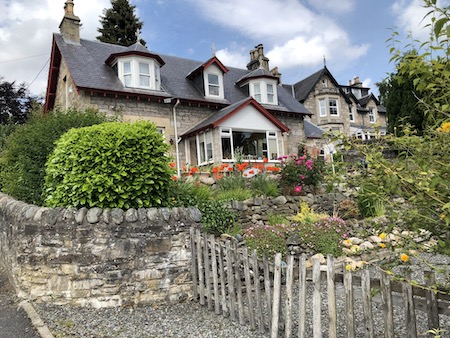
Pitlochry. A regional center with great shopping and restaurants, it has at least two very good bookstores. There are lovely homes on side streets, and some of them can be rented (self-catered). The downtown train station offers connections to anywhere in Europe. Previous visitors told us that this was the Gatlinburg or Myrtle Beach of Scotland, but we did not match our perception. Although like those U.S. towns the shopping is very good, the town is much more charming and not a bit tacky. Nearby is the Queens View, an overlook popularized by Queen Victoria, who loved the majestic views over Loch Tummel and Loch Rannoch. The area is popular with vacationers and retirees who buy or rent manufactured homes, cabins, and cabins and enjoy the mountain scenery. Kenmore is home to a 9 hole golf course and bespoke holiday homes.
Bridge of Allan and Stirling. Popular with Scottish retirees, this very upscale town is home to Stirling University. Nearby hills feature Stirling Castle and the William Wallace monument.
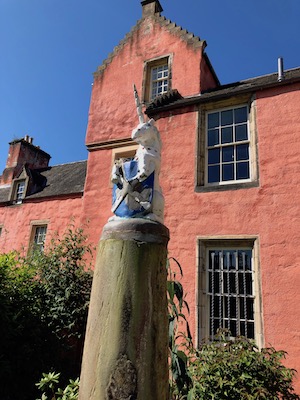
Dunfermline. This struck us as a place that would make a beautiful and walkable retirement town. It was the birthplace of Andrew Carnegie, who returned years later, famous and wealthy, and made the town even more special. The Carnegie Library, completely redone inside but maintaining its classic exterior, is one of the finest libraries we have ever visited. St. Margaret’s Cathedral combines Norman and Gothic themes and several churches as it was expanded over the centuries. There are magnificent parks, gardens, and castles in the area near the Carnegie Museum. We saw apartments advertised for retirees downtown.
On the East coast above Edinburgh
Elie. It is a very small former fishing village that used to be home to sea captains, now popular with retirees. The area of East Fife is dotted with communities like Elie and St. Monans.
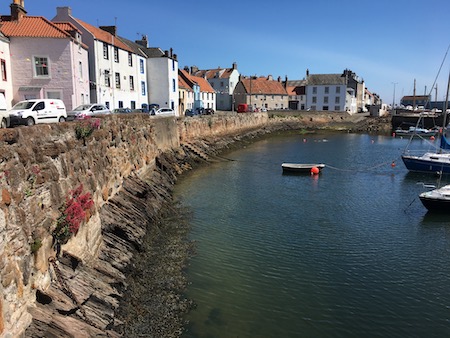
Anstruther. The biggest of the fishing towns on the coast here is near St. Andrews. The Waterfront is one of many restaurants reputedly offering the best fish and chips in Britain. The harbor is magnificent and so are the small homes and gardens in the village.
St Andrews. A walled city, it is one of the most important towns in Scotland St. Andrews University is one of the most prestigious universities in Europe, and its quadrangles and courtyards dominate the downtown. St. Andrew is the patron saint of Scotland and his remains are reputedly buried in the ruins of the vast ruins of St. Andrews Cathedral. And just about everyone has heard of the famous St. Andrews golf courses.
How easy is it to retire here
British citizens and those from countries in the EU can easily retire in Scotland. Residents of British Commonwealth nations have an advantage as well. Coming from other countries, it is extremely difficult to move here. Immigration laws are complex and changing fast as the world tightens up on who gets to move where. For example we know a couple with a husband who is a Scot and the wife is an American. Although they lived legally in Scotland for several years after they married, they moved back to America for a decade or so. Now, moving back to Scotland after many years spent in America has proved difficult, because she did not maintain her Scottish residency. Wealthy individuals who can invest in Scotland enjoy easier entry. For example, you can either buy a 2 million pound bond, or start or purchase a business with multiple employees. If you have a Scottish grandparent you might qualify. But those options are possible for only a small set of would be Scottish residents. For most non-European Union or non-British Commonwealth residents, there is really one option for retiring here. It is not perfect, but you can live here for up to 6 months every year. As one friend of ours commented, that option has its drawbacks, including the expense of owning or renting property in 2 countries. See our Country guide to retiring in Scotland for more.
A somewhat uncertain future
Politically there is a lot going on in Scotland, not all of it good. A vote for independence a few years ago failed narrowly with the vote divided by age – younger people tended to vote for independence while older citizens usually wanted to remain as part of Great Britain. The other troublesome issue is Brexit. Most Scots voted to stay in the European Union (EU). Brexit and Independence are related. People we talked to expect that the next time an independence vote comes up the country will secede from Great Britain. Wanting to stay in the EU is a big reason why. Hanging in the balance until all this is resolved are many other concerns. Those include the economy, housing prices, and immigration. One popular theory is that independence could open up immigration for the country, which is aging and losing population.
Bottom line
An international retirement isn’t for everyone. But Scotland is easy and familiar, and Americans speak almost the same language! If the adventure and beauty of a far off location appeal to you, it might make a great choice.
Comments? Have you considered retiring to Scotland, or some other country? If so do you have a connection there,be it family or friend? Tell us about pluses and minuses that might come with retiring here.






Comments on "Tempted by Retirement in Scotland?"
Ed LaFreniere says:
Thank you for this fine overview — especially for those of us who need to escape the summer Scottsdale heat and could use a base for European travel!
Jennifer says:
My neighbors just left last night for a month in Edinburgh--they are of Scottish heritage and rent the same townhome every year. They go to the jazz festival and tour the countryside and the distilleries. It is nice and cool there now yesterday was in the 50's. They will have a great time as they do each year. They have no desire to retire there due to health issues, but do visit the possibility from time to time.
Dee says:
Move to Seattle instead! Similar climate and you can (more or less!) understand the people. Scottish accents charming but rather thick!!
Diane Greto says:
Beautiful pictures and info and Scotland has been on my bucket list as both maternal grandparents and mother were born in Scotland. Will plan to spend some time there next summer...thanks for the suggestion, Jennifer!
Larry says:
I think about living in Scotland often. As a golfer, I have found no better variety of courses in the world. After summer trips to the Old Sod the last six years, I decided to join the Crail Golfing Society, home to two wonderful layouts beside the North Sea. Fees are ridiculously low, about $200 per year, and you get 8 rounds of golf with that. Crail, just 9 miles from St. Andrews and a 70-minute drive from the Edinburgh airport, is a postcard-perfect fishing village. For a stay of six months or less each year, you could find suitable lodging for under $350,000 or an apartment to lease for six months or less. Last year, I stayed in Edinburgh for a few days before heading to Crail. It was a hoot to leave my hotel with my golf clubs on my shoulder, walk down the hill to the train station and take the train a half hour to North Berwick (pronounced "berrick") to play its famed golf course. In the spirit of full disclosure, good restaurants are not in plentiful supply, the chief entertainment option in a small town like Crail are the pubs, driving on the "wrong" side of the road is daunting, and the Scottish brogue does take a bit of getting used to. But the people are wonderful, the landscape is breathtaking and the golf is paradise.
Admin says:
We just posted this question from a 68 year old female retired New Zealander with family because it is a good one.We will refer her to this post. You can find all kinds of good retirement information in our mini-retirement guides to all 50 states and more than 20 countries, as well as in our State Directories.
-----
I would like to get as much information as possible from you with regard to emigrating to Scotland to spend my last years with my family when the COVID situation finally allows. Even websites and/or links you can provide would be appreciated as I'd like to have everything in place ready for my eventual travel to Scotland.
----
See our Country guide to retiring in Scotland, and our Scottish Directory of towns and communities for more.
Flatearth6 says:
What I do NOT see mentioned is the fact that, like the rest of the UK, if you are a US citizen, you must be able to prove that you have at least $50,000 of income - PER PERSON, to be able to retire there. That is what held us back. Pretty much every country have some restrictions and rules to be met - especially if you want to emigrate. As a New Zealander, you are already have a connection to the UK so the rules may be different, and less strenuous for you. Check with a Consulate office.